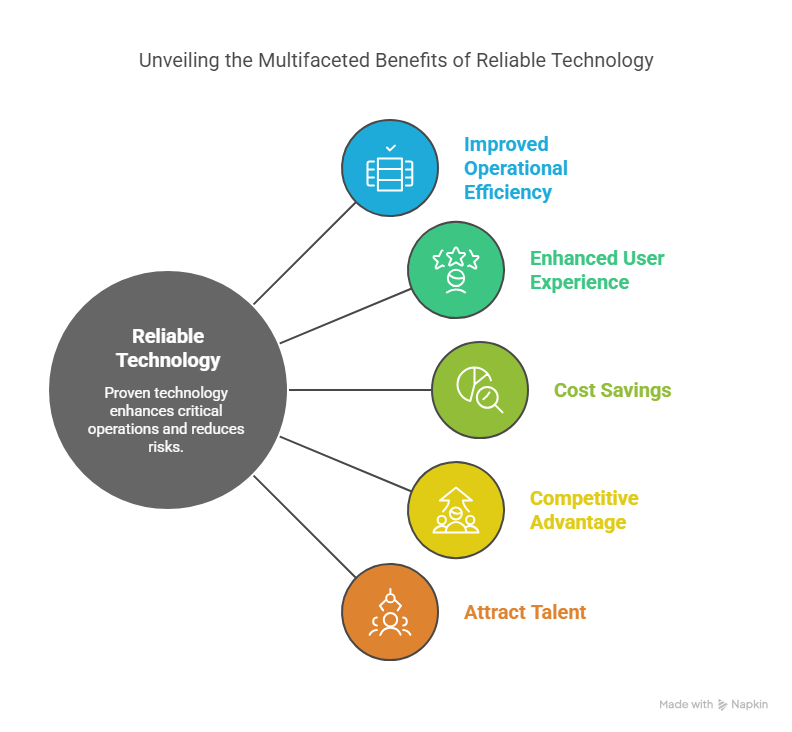MAY NOT BE REPRODUCED WITHOUT PERMISSION
91% of organizations are investing in some form of digital transformation, according to Gartner. In fact, nearly three-quarters of organizations see digital and technical upgrades as a top priority.
It’s no surprise.
Technology has evolved considerably over the past few years. Advanced automation, cloud resources, apps, AI, and robotics create pathways to streamline operations and accelerate the pace of production across a wide range of industries.
In nearly every industry, we rely more today on technology than ever before. Not only does technology have to have cutting-edge functionality for users, but it also has to be exceptionally reliable. If it doesn’t work when you need it, it can lead to highly public failures that can cause you to miss deadlines or damage your reputation. This is especially true in fields like news and video production.
The Problem: Unreliable Technology in Critical Operations
Reliability is like breathing. You don’t think about it until you can’t do it. Then, it’s a crisis.
While an equipment failure might not put your health in jeopardy, it can put your business at risk. The repercussions of technology failures in critical operations can be devastating.
When systems falter, the effects ripple through entire organizations, disrupting workflows, impacting deliverables, frustrating employees, and potentially causing financial losses. In the broadcasting industry, for instance, a seconds-long equipment failure during a live event can result in missed coverage and disappointing viewers.
During breaking news, you need to quickly gather, process, and disseminate information. If you can’t do that consistently, it can erode audience trust. If a system crash takes you off the air or causes you to miss a newscast, you might drive viewers looking for news directly to your competition.
The financial implications of unreliability extend beyond immediate losses. Frequent disruptions can lead to increased operational costs, as resources are diverted to troubleshooting and emergency repairs. And, the long-term impact on your reputation can be substantial, potentially resulting in loss of viewership, reduced ad revenue, and diminished market share.
Consistent technology failures can frustrate workers, leading to poor morale and increased staff turnover. When you consider that only a third of workers are actively engaged in work already according to a 2024 Gallup survey, frustration can impact even your best employees. You simply cannot take the risk — especially where turnover is already high and recruiting is extremely challenging.
The Consequences of Unreliability
Disruptions and downtime are the most visible consequences of unreliable technology and a concern in any industry. In the video production industry, for example, system failures can cause you to jeopardize relationships with clients and partners.
If you can’t deliver content on time due to technical issues, you’ll likely lose projects to more reliable competitors.
Customer dissatisfaction is another critical consequence. In the broadcast industry, viewers have come to expect seamless, high-quality content delivery. Technical glitches, poor audio quality, or missed newscasts can quickly lead to viewer frustration and, ultimately, to them switching to alternative sources. If you can’t reliably post content to your website, apps, or social media because of technical hurdles, your followers will look elsewhere.
The Solution: Embracing Reliable Technology
The key to mitigating these risks lies in embracing reliable technology solutions. No matter how great a product looks, you cannot afford to risk your reputation on anything that isn’t reliable and redundant. You must select dependable hardware and software and partner with technology providers with a proven track record of excellence in the industry.
Key features you need include:
- Robust hardware: Designed to withstand the demands of continuous operation in high-pressure environments.
- Well-tested software: Proven to adhere to the highest levels of quality assurance to minimize bugs and vulnerabilities.
- Redundancy and failover systems: Ensuring continuity of operations even in the face of individual component failures.
You also need round-the-clock support in case troubleshooting is needed and a partner that understands the urgency of your business. When technology performs flawlessly under pressure, it allows journalists and broadcasters to focus on what they do best: delivering timely, accurate information to their audience.
Innovative solutions are great and can give you a leg up on your competitors — but only if they provide the reliability you need to deliver consistent quality.
The Benefits of Reliable Technology in Critical Operations

Any time you are evaluating new technology, you should always be focusing on risk awareness. Consider both the benefits you get as well as the impact of a failure. This can help guide your selection to find proven technology that has the functionality you need.
When you invest in reliable technology for your critical operations, you see significant benefits, including:
- Improved operational efficiency: Teams can work more effectively, focusing on content creation and delivery rather than troubleshooting technical issues.
- Enhanced user experience and customer satisfaction: Ensures consistent, high-quality output, leading to increased loyalty and positive brand perception.
- Cost savings: Even if the initial investments may be higher, the reduction in downtime, maintenance costs, and potential losses due to failures result in significant long-term savings.
- Competitive advantage: Organizations known for reliable operations and consistent quality output gain a significant edge in the market.
- Attract talent: Top-tier talent wants to work with high-quality equipment so they can focus on their job without worrying about technical issues.
Choose Your Technology Partner Carefully
When you’re considering technology, you must prioritize reliability. Look for a tech partner with a proven record of excellence. Years of consistent performance and reliability demonstrate expertise and can provide you with the confidence you need to operate, knowing that the equipment performs consistently even under the most demanding conditions.
